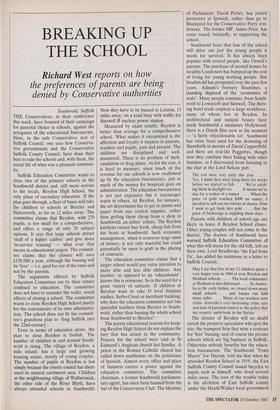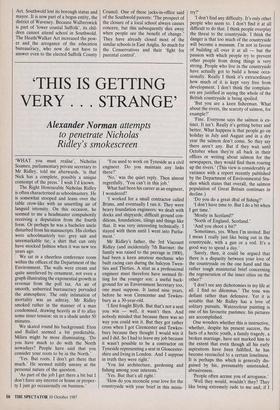BREAKING UP THE SCHOOL
Richard West reports on how
the preferences of parents are being denied by Conservative authorities
Southwold, Suffolk THE Conservatives, in their conference this week, have boasted of their campaign for parental choice in schools, against the arrogance of the educational bureaucrats. Here, in the safe Conservative seat of Suffolk Coastal, one sees how Conserva- tive governments and the Conservative Suffolk County Council, have done their best to ruin the schools and, with them, the social life of what was a pleasant commun- ity.
Suffolk Education Committee wants to close two of the primary schools in the Southwold district and, still more serious to the locals, Reydon High School, the only place of secondary education. If the plan goes through, a fleet of buses will take the children to schools at Beccles and Halesworth, as far as 12 miles away. The committee claims that Reydon, with 270 pupils, is too small for a comprehensive, and offers a range of only 20 subject options. It says that large schools attract 'staff of a higher calibre' and give more 'in-service training' — what ever that means in educationist jargon. The commit- tee claims that the closure will save £150,000 a year, although the bussing will be 'free' — i.e. paid for out of the rates and not by the parents. The arguments offered by Suffolk Education Committee are by their nature confined to education. The committee does not have-to consider the wider, social effects of closing a school. The committee wants to close Reydon High School purely for the convenience of its own administra- tion. The school does not fit the commit- tee's grandiose plan to 'drag Suffolk into the 22nd-century'.
Even in terms of education alone, the plan to close Reydon is foolish. The number of children in and around South- wold is rising. The village of Reydon, a mile inland, has a large and growing housing estate, mostly of young couples. The number of pupils at Reydon is low simply because the county council has short- ened its natural catchment area. Children at the neighbouring village of Walberswick, the other side of the River Blyth, have always ,attended schools in Southwold. Now they have to be bussed to Leiston, 13 miles away, on a road busy with traffic for Sizewell B nuclear power station.
Measured by exam results, Reydon is better than average for a comprehensive school. What makes it exceptional is the affection and loyalty it inspires in parents, teachers and pupils, past and present. The children are disciplined and well- mannered. There is no problem of theft, vandalism or drug abuse. As for the cost, it is hard to measure, since much of the revenue for our schools is now swallowed up by the education bureaucracy, just as much of the money for hospitals goes on administration. The education bureaucracy is not just expensive but it encourages waste in others. At Reydon, for instance, the art department has to get its paints and paper from one central supplier, rather than getting them cheap from a shop in Southwold, an artists' colony. The Reydon kitchens cannot buy fresh, cheap fish from the boats at Southwold. Such economic management, when it concerns large sums of money, is not only wasteful but could potentially be open to graft in the placing of contracts.
The education committee claims that a larger school would pay extra attention to more able and less able children. Any teacher, as opposed to an 'educationist', knows this is nonsense. So is the need for a great variety of subjects. If children at Reydon want to take 0 level feminist studies, Serbo-Croat or merchant banking, why does the education committee not bus specialist teachers from Beccles to South- wold, rather than bussing the whole school from Southwold to Beccles?
The purely educational reasons for keep- ing Reydon High School do not explain the fury that has arisen in the community. Prayers for the school were said in St Edmund's Anglican church last Sunday. A priest in the Roman Catholic church has called down anathemas on the politicians of Ipswich. Almost every office and place of business carries a poster against the education committee. The committee chairman, a former Southwold parliamen- tary agent, has since been banned from the bar of the Conservative Club. The Member of Parliament, David Porter, has joined protestors at Ipswich, rather than go to Blackpool for the Conservative Party con- ference. The former MP, James Prior, has come round, belatedly, to supporting the school.
Southwold fears that loss of the school will drive out just the young people it needs for survival. It has always been popular with retired people, like Onvell's parents. The purchase of second homes by wealthy Londoners has bumped up the cost of living for young working people. But Southwold has prospered over the past few years. Adnam's brewery flourishes, a standing disproof of the 'economics of scale'. Many people commute from South- wold to Lowestoft and Sizewell. The thriv- ing hotel trade employs a large workforce, many of whom live in Reydon. Its architectural and natural beauty have made Southwold a miniature Hollywood: there is a Dutch film crew at the moment — 'a fairly objectionable lot'. Southwold has twice been used for the drowning of Steerforth in movies of David Coppetfield, and there are real-life Peggottys, though now they combine their fishing with other business, as I discovered from listening to the chat at the Lord Nelson pub:
The cod were very early this year Yes, I think they were lying there for weeks before we started to fish . . . . We're catch- ing them in daylight too. . . . It means we're due for a corker of a winter . . . . When the price of gold reached $400 an ounce, I decided to sell out two blocks of shares. Now I want to get back into gold . . . . But the price of brokerage is crippling these days. Parents with children of school age are
likely to leave if Reydon School closes.
Other young couples will not come to the district. The doctors of Southwold have warned Suffolk Education Committee of what this will mean for the old folk, left on their own. Lord Stradbroke 'the Earl from Oz', has added his testimony in a letter to Suffolk Council: May I say that five of my 12 children spent a very happy year in 1984 at your Reydon and Henham schools. . . . The local community at Henham is also distressed. . . . In Austra- lia in the early Sixties, we closed down many small schools . . . and busses our kids many miles . . . . Many of our teachers now relate Australia's ever-increasing crime rate and lack of parental control to the policy that my country undertook in the Sixties.
The closure of Reydon will no doubt enrich the property speculator who gets the site; the transport firm that wins a contract for 'free' bussing; and of course the private schools which are big business in Suffolk. Otherwise nobody benefits but the educa- tion bureaucrats. The Southwold 'Town Mayor' Joe Hurran, told me that when he attended Reydon School in 1919, the East Suffolk County Council issued bicycles to pupils such as himself, who lived several miles away. The root of the trouble today is the abolition of East Suffolk county under the Heath/Walker local government Act. Southwold lost its borough status and mayor. It is now part of a bogus entity, the district of Waveney. Because Walberswick is part of 'lower coastal Suffolk', its chil- dren cannot attend school in Southwold. The Heath/Walker Act increased the pow- er and the arrogance of the education bureauCracy, who now do not have to answer even to the elected Suffolk County Council. One of these jacks-in-office said of the Southwold parents: 'The prospect of the closure of a local school always causes concern, but this subsequently dies away when people see the benefit of change.' They have already closed most of the similar schools in East Anglia. So much for the Conservatives and their 'fight for parental control'.



























































 Previous page
Previous page